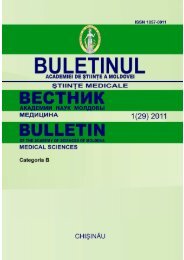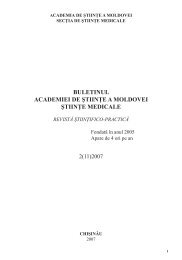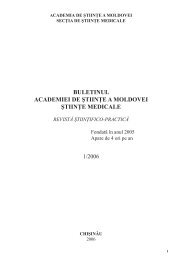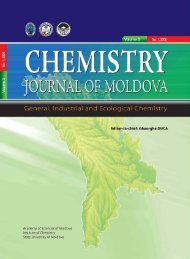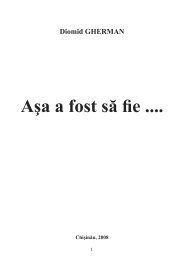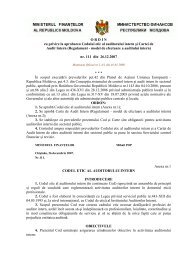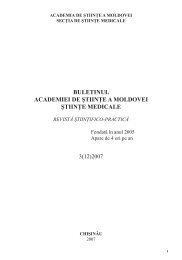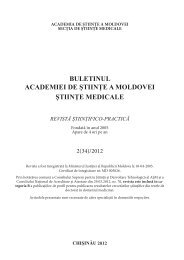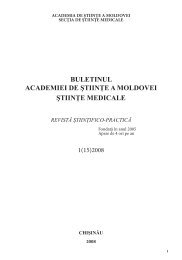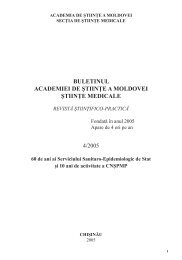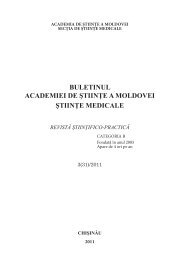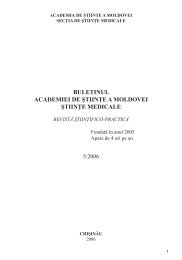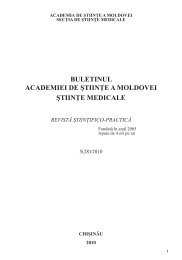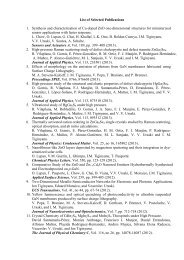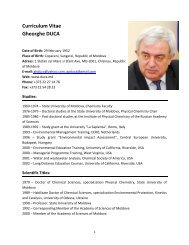stiinte med 1 2012.indd - Academia de ÅtiinÅ£e a Moldovei
stiinte med 1 2012.indd - Academia de ÅtiinÅ£e a Moldovei
stiinte med 1 2012.indd - Academia de ÅtiinÅ£e a Moldovei
Create successful ePaper yourself
Turn your PDF publications into a flip-book with our unique Google optimized e-Paper software.
Ştiinţe Medicale<br />
IVS3+2 T>C; IVS3+125 C >A; IVS3+184 T>A;<br />
R65Q; R67C [5, 9, 16, 26, 37], dar până în prezent<br />
N34S rămâne a fi cea mai frecvent întâlnită.<br />
Mutaţiile SPINK1 îşi exercită acţiunea prin diferite<br />
mecanisme: mutaţia M1T, care distruge codonul<br />
<strong>de</strong> start, are o rată <strong>de</strong> moştenite ereditară mai dominantă,<br />
iar mutaţia N34S SPINK1 este autosomal<br />
– recisivă.<br />
Inci<strong>de</strong>nţa mutaţiei N34S este <strong>de</strong> aproximativ<br />
1-2,5% în populaţia generală [24], din care aproximativ<br />
1% este heterozigotă pentru N34S [38] şi mai<br />
puţin <strong>de</strong> 1% din purtători <strong>de</strong>zvoltă pancreatite [26,<br />
40]. Frecvenţa mutaţiei N34S este consi<strong>de</strong>rabil mai<br />
mare în rândurile pacienţilor care <strong>de</strong>zvoltă pancreatite<br />
<strong>de</strong>cât printre cei sănătoşi, iar rata asociaţiei pancreatitei<br />
este mai mare în tipul homozigot al mutaţiei<br />
N34S [13, 14], la persoanele sănătoase fiind <strong>de</strong>tectată<br />
cu o frecvenţă <strong>de</strong> 1/10.000.<br />
Studii recente au relatat că PSTI/SPINK1 este<br />
implicată, <strong>de</strong> asemenea, în autoreglarea fagocitozei<br />
celulelor acinare, proliferarea şi creşterea unei varietăţi<br />
<strong>de</strong> patologii celulare [35].<br />
Concluzie. Rata mică a <strong>de</strong>zvoltării PC în rândurile<br />
purtătorilor mutaţiilor SPINK1 sugerează necesitatea<br />
cercetării mai complexe a mutaţiei respective,<br />
în corelaţie cu implicarea în patogeneză a altor factori<br />
<strong>de</strong> risc genetici şi <strong>de</strong> <strong>med</strong>iu.<br />
91<br />
Bibliografie<br />
1. Ţâbârnă I., Bugai R., Pancreatita cronică. Actualitate,<br />
etiologie şi patogenie (I). Sistemul <strong>de</strong> clasifi cări.<br />
Diagnosticul <strong>de</strong> laborator şi instrumental (II). Buletinul<br />
Aca<strong>de</strong>miei <strong>de</strong> Ştiinţe a <strong>Moldovei</strong>. Ştiinţe <strong>med</strong>icale. 2008;<br />
2 (16): 144-158.<br />
2. Bernardino A.L.F., , Reis Guarita D.R., Mott C. B.,<br />
Arcon M.G., Pedroso M., Machado C.C., Laudanna A.A.,<br />
Tani C.M., Almeida F.L., Zatz M., CFTR, PRSS1 and<br />
SPINK1 Mutations in the Development of Pancreatitis in<br />
Brazilian Patients. J. Pancreas (Online), 2003; 4(5):169-<br />
177.<br />
3. Bhatia E., Durie P., Zielenski J., Lam D., Sikora<br />
S.S., Choudhuri G., Tsui L.C., Mutations in the cystic<br />
fi brosis transmembrane regulator gene in patients<br />
with tropical calcifi c pancreatitis. Am J Gastroenterol.,2000;95:3658–3659.<br />
4. Charnley R.M. Hereditary pancreatitis. Wid. J. Gastroenterol.,2003;<br />
9 (1): 1-4.<br />
5. Chen J.M., Mercier B., Audrezet M.P., Ferec C., Mutational<br />
analysis of the humanpancreatic secretory trypsin<br />
inhibitor (PSTI)gene in hereditary and sporadic chronic<br />
pancreatitis. J. Med. Genet., 2000;37:67–69.<br />
6. Chen J.M., Montier T., Ferec C., Molecular pathology<br />
and evolutionary psichological implications of pancreatitis-assosiated<br />
cationic trypsinogen mutations. Hum.<br />
Genet., 2001;103(3):245-252.<br />
7. Drenth J.P.H., Te Morsche R., Jansen J.B., Mutations<br />
in serine protease inhibitor Kazal type-1 are strong by<br />
associated with chronic pancreatitis. Gut, 2002; 50: 687-<br />
692.<br />
8. Etemad B., Whitcomb D.C., Chronic Pancreatitis:<br />
Diagnosis, Classifi cation and New genetic Developments.<br />
J. Gastroenterol. 2001; 120: 682-707.<br />
9. Grigorescu M., Genetic factors in pancreatitis. Romanian<br />
Journal of Gastroenterology, 2005; 14(1): 53-61.<br />
10. Gasiorowska A., Talar-Wojnarowska R., Czupryniak<br />
L., Smolarz B., Romanowicz-Makowska H., Kulig<br />
A., Malecka-Panas E., The prevalence of Cation Trypsinogen<br />
(PRSS1) and Serine Protease Inhibitor, Kazal Type<br />
1 (SPINK1) Gene Mutations in Polish Patients with Alcoholic<br />
and Idiopathic Chronic Pancreatitis. Dig. Dis. Sci.,<br />
2011; 56(3): 894–901.<br />
11. Hassan Z., Mohan V., Ali L. et al., SPINK 1 is a<br />
susceptibility genefor fi brocalculous pancreactic diabetes<br />
in subjects from the Indian subcontinent. Am. J. Hum. Genet.,<br />
2002; 71: 964-968.<br />
12. Hirota M., Ohmuraya M., Baba H., The role of<br />
trypsin, trypsininhibitor, and trypsin receptor in the onset<br />
and aggravationof pancreatitis. J Gastroenterol, 2006;<br />
41:832-836.<br />
13. Hirota M., Ohmuraya M., Baba H., Genetic background<br />
of pancreatitis. Postgrad. Med. 2006; 82: 775-778.<br />
14. Hirota M., Kuwata K., Ohmuraya M., et al., From<br />
acute to chronic pancreatitis: the role of mutation in the<br />
pancreatic secretory tripsin inhibitor gene. JOP 2003; 483-<br />
488.<br />
15. Horii A., Kobayashi T., Tomita N. et al., Primary<br />
structure of human pancreatic secretory trypsinogen inhibitor<br />
(PSTI) gene. Biochem. Biophys. Res. Commun.,<br />
1987; 149: 635-641.<br />
16. Kuwata K., Hirota M., Sugita H. et al., Genetic<br />
mutations in exons.3 and 4 of the pancreatic secretory<br />
trypsin inhibitor in patients with pancreatitis. J. Gastroenterol.<br />
2001; 36: 612-618.<br />
17. Kazal La., Spicer Ds., Brahinsky Ra., Isolation of<br />
a crystalline trypsin inhibitor-anticoagulant protein from<br />
pancreas. J. Am. Chem. Soc. 1948; 70: 3034-3040.<br />
18. Keim V., Genetics of pancreatitis Scandinavian J.<br />
Of Surgery. 2005.94; 103-107.<br />
19. Lai A., Lai D.R., Hereditary pancreatitis. Pediatr.<br />
Surg. Int. 2010. Dec;26(12):1193-9.<br />
20. Lerch Marcus M., Genetic risc factors for pancreatitis.<br />
Genetics in gastrointestinal and liver diseases. Cluj-<br />
Napoca. 7/9 apr. 2011. In:Journal of Gastrointestinal and<br />
liver diseases.2011; 20 (1): .9-10.<br />
21. Marchbank T., Freeman T.C., Playford R.J. Human<br />
pancreatic secretory trypsin inhibitor. Distribution, actions<br />
and possible role in mucosal integrity and repair. Digestion<br />
1998; 59:167-174.



